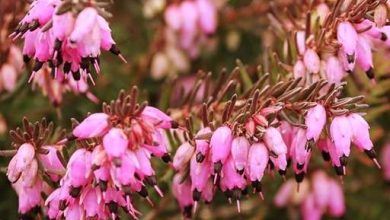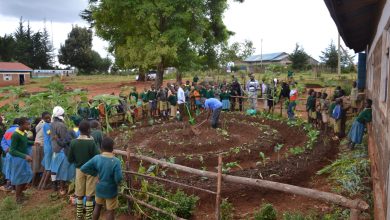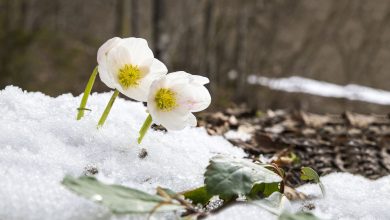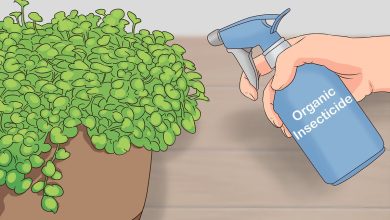What is composting. Conditions and materials for composting
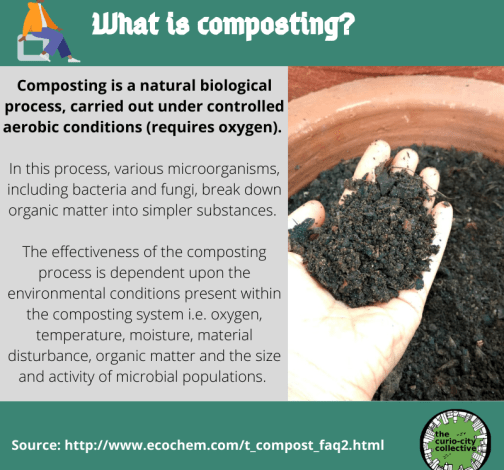
Composting is an ecological technique widely used in organic gardens with which organic waste from the garden, kitchen and garden is used to make one of the most complete ecological fertilizers: compost.
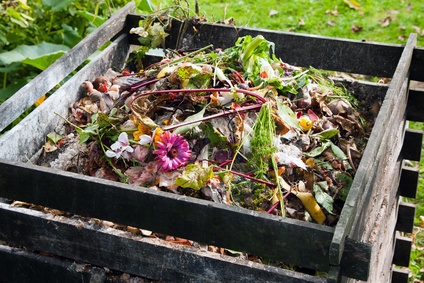
What is composting?
It is a technique for making compost, one of the best organic fertilizers that we can use to fertilize or fertilize the organic garden, not only because of its fantastic properties to condition and improve the soil, but also because we can obtain it ourselves. With this ecological technique we produce a product rich in humus by decomposing organic waste, just as nature does but in much larger quantities and more quickly.
Well…it’s not really us who make it, but the insects, worms and microorganisms like fungi and bacteria that live and grow in the future compost. We are in charge of gathering the necessary elements so that these little inhabitants of the garden can work.
Benefits of compost
As we have seen, compost acts as a natural fertilizer for the soil, so the first to benefit will be the crops, which can obtain more and better nutrients from it. In addition to this, there are many other advantages of using compost in the garden:
- Improves soil quality: improves soil structure, water and nutrient holding capacity, and prevents erosion. In addition, it provides beneficial microorganisms and reduces the availability of harmful heavy metals.
- Improves the health and productivity of crops: acts as a phytofortifier that improves the defenses of plants, makes them more resistant to pests and infections and increases the harvest.
- Environmental benefits: composting is an ecological technique that favors the sustainability of the planet (saving natural resources, recycling waste, etc.).
- Economic benefits: we do not buy the organic matter but we manufacture it ourselves using the waste plant material from the garden and the organic waste from the kitchen.
As you can see, it is a perfect technique if what you want is an ecological and sustainable garden. Thanks to the garden we can eat delicious and healthy food, why not thank him by also making quality food for him?
Optimal conditions for composting in the garden
If you have definitely decided to compost in the garden, read on to learn how to compost and what conditions the process must have.
You will have to know what the best conditions are so that the microorganisms that live in the waste can be «at ease» and produce quality compost as quickly as possible.
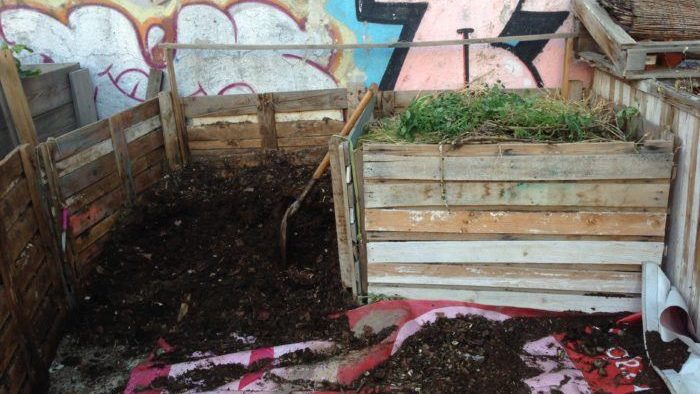
To break down the waste and transform it into compost, the beneficial microorganisms carry out a series of fermentation reactions, which will occur if the conditions are:
- Adequate Moisture – There should be “wet matter” and it is also important to water it if it stays dry. The residue should appear moist but not dripping. If there is excess moisture, residue such as sawdust can help you solve this problem.
- Presence of air: you have to turn or stir the piles frequently so that the inner part does not rot due to lack of air, in this way we get a more homogeneous material and also speed up the fermentation process. There are materials that you can incorporate into the compost to improve aeration: more or less large or irregular waste that creates holes that facilitate air circulation (bark, cut branches, fibers…). If you have the compost in containers, keep in mind that they must have holes or ventilation openings and have a free base (the best thing is that the compost is in direct contact with the soil so that insects and microorganisms can access it).
- Temperature: high temperatures must be reached (more than 50-60ºC inside the heap) so a sunny place, although not strictly necessary, will help speed up the process. Also, having a considerable pile, of more than 200 liters, means that this temperature is reached in a few days and fermentation begins as soon as possible, which is what interests us.
- Appropriate size of the waste: the pieces of waste should not be too large -because they take a long time to decompose-, nor too small -because they are compacted and make it difficult for air to pass through-. The particles should be from 1 to 5 cm and the whole should be more or less homogeneous (not some particles much larger than others).
- Balance of materials: there must be a balance between residues rich in carbon, that is, in cellulose and sugars, and residues rich in nitrogen.
Materials to make homemade compost
There is a wide variety of compostable materials that can be used to make this homemade compost.
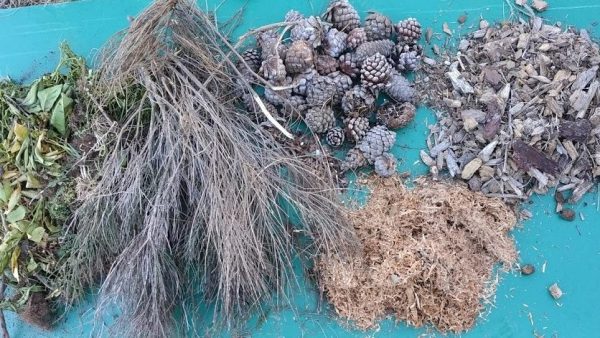
Nitrogen-rich or “green” waste
They are the wet matter of the compost, so they decompose quickly (they usually generate a bad smell):
- Stems, leaves and other green plant remains from our crops
- Kitchen waste such as leftover fruit and vegetables, fish…
- cut grass
- Coffee grounds, tea bags…
- Algae
- Manure and slurry
- green manures
Carbon-rich or “brown” waste
They are dry so they take a long time to decompose, although they do so without leaving bad odours. They must be moistened before becoming part of the compost:
- straw and hay
- Sawdust
- Woody branches and bark (pruning debris, for example)
- Weeds and dry leaves
- Shredded paper or cardboard
- dried fruit shells
- egg shells
- pine needles
Materials that can NOT be used for composting
- Non-degradable material: ceramic remains, glass, plastics, aluminum foil, packaging…
- Pieces of wood that have been treated or cork
- Remains of diseased plants or weeds that we have eliminated from the garden
- Human or pet excrement such as dogs and cats
- Leftover meat, bones, or fatty foods
How to make organic homemade compost?
The following article will see how to make a homemade compost. In it you will find the best ideas to make a good organic fertilizer for the orchard or garden. You can consult it in this link: « How to make homemade compost step by step «.
In addition, we have also learned how to make a compost bin or composting box with wooden pallets, a very fun and entertaining activity to do with children.
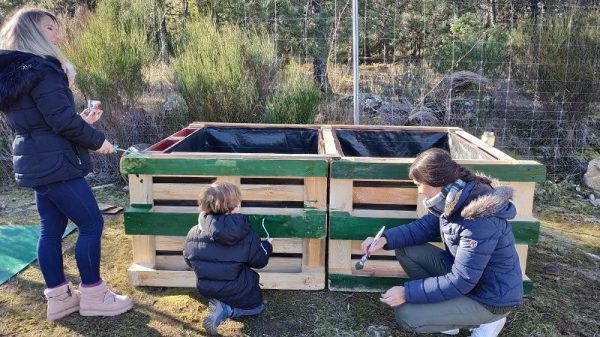
You can leave your comments in the comment thread below if you have questions about composting organic waste or want to tell us about your experience making homemade compost. Until next time!
References
- University of Quintana Roo (Mexico), 2001. What is compost and what are its benefits. Integrated Management of Coastal Resources Program.
- De Santos, S. & Urquiaga, R., 2013. Home Composting and Vermicomposting. Informative Folder Bulletin of CENEAM (National Center for Environmental Education), April 2013, p. 5-14.
- Schwarz, M. & Bonhotal, J., 2011. Composting at Home – The Green and Brown Alternative. Cornell Waste Management Institute, Cornell University (USA).
- Meddeb, S. et al., 2018. Effects of biochar and compost on a moderately heavy metal contaminated urban garden soil. Proceedings of the VIII Iberian Congress of Soil Sciences, pag. 331-334. Ed. Spanish Society of Soil Science

